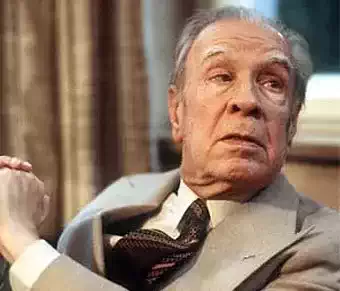

Jorge Luis Borges
Jorge Francisco Isidoro Luis Borges Acevedo Buenos Aires, 24 de agosto de 1899 — Genebra, 14 de junho de 1986 foi um escritor, poeta, tradutor, crítico literário e ensaísta argentino.
1899-08-24 Buenos Aires, Argentina
1986-06-14 Genebra, Suíça
986355
13
77
Mayo 20, 1928
Now he is invulnerable like the gods.
Nothing on earth can hurt him, not the coldness of a woman, nor the tuberculosis, nor the troubles of verse, nor that white thing the moon, which he is no longer obliged to capture in words.
He strolls beneath the lindens; he looks at balustrades and doorways, but not to remember them.
Now he knows how many nights and how many morning he has left.
His will has imposed on him a precise discipline. He will perform specific acts, he will cross foreseen street corners, he will touch a tree or a grille, so that the future might be as irrevocable as the past.
He behaves in that way so that the event which he desires and which he fears my be nothing else than the conclusive end of a series.
He walks down 49th Street; it strikes him that he will never go through this or that side door.
Without their suspecting it, he has taken leave now of many friends.
He thinks of what he will never know, whether the next day will be rainy.
He meets an acquaintance and cracks a joke. He knows that this incident will be, on some occasion, an anecdote.
Now he is invulnerable like the dead.
At a set time, he will climb some marble stairs. (This will survive in the memories of others.)
He will go down to the men"s room; on the checkered floor the water will soon wash away the blood. The mirror is waiting for him.
He will slick back his hair, he will adjust the knot of his tie (he was always a bit of a dandy, as befits a young poet), and he will try to imagine that the other man, the one in the glass, is doing these things and that he, the double, is repeating them. His hand will no tremble when the end comes. Passively, magically, the pistol will by now have rested against the temple.
That, I believe, is how it happened.
Jorge Luis Borges | "Poesia Completa", págs. 303 e 304 | Debolsillo, 3ª. edição, 2016
Nothing on earth can hurt him, not the coldness of a woman, nor the tuberculosis, nor the troubles of verse, nor that white thing the moon, which he is no longer obliged to capture in words.
He strolls beneath the lindens; he looks at balustrades and doorways, but not to remember them.
Now he knows how many nights and how many morning he has left.
His will has imposed on him a precise discipline. He will perform specific acts, he will cross foreseen street corners, he will touch a tree or a grille, so that the future might be as irrevocable as the past.
He behaves in that way so that the event which he desires and which he fears my be nothing else than the conclusive end of a series.
He walks down 49th Street; it strikes him that he will never go through this or that side door.
Without their suspecting it, he has taken leave now of many friends.
He thinks of what he will never know, whether the next day will be rainy.
He meets an acquaintance and cracks a joke. He knows that this incident will be, on some occasion, an anecdote.
Now he is invulnerable like the dead.
At a set time, he will climb some marble stairs. (This will survive in the memories of others.)
He will go down to the men"s room; on the checkered floor the water will soon wash away the blood. The mirror is waiting for him.
He will slick back his hair, he will adjust the knot of his tie (he was always a bit of a dandy, as befits a young poet), and he will try to imagine that the other man, the one in the glass, is doing these things and that he, the double, is repeating them. His hand will no tremble when the end comes. Passively, magically, the pistol will by now have rested against the temple.
That, I believe, is how it happened.
Jorge Luis Borges | "Poesia Completa", págs. 303 e 304 | Debolsillo, 3ª. edição, 2016
1316
0
Mais como isto
Ver também
 Escritas.org
Escritas.org












